|
|
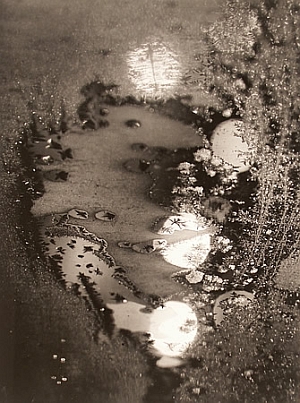 Frosted Window
Minor White
1908-1976 ______________________________________
Writing and Difference
Jacques Derrida
Translated by Alan Bass
It might be that we are all tattooed savages since Sophocles. But there is more to Art than the straightness of lines and the perfection of surfaces. Plasticity of style is not as large as the entire idea.... We have too many things and not enough forms.
(Flaubert, Preface d la d'tcrivain)
If it recedes one day, leaving behind its works and signs on the shores of our civilization, the structuralist invasion might become a question for the historian of ideas, or perhaps even an object. But the historian would be deceived if he came to this pass: by the very act of considering the structuralist invasion as an object he would forget its meaning and would forget that what is at stake, first of all, is an adventure of vision, a conversion of the way of putting questions to any object posed before us, to historical objects-his own-in particular. And, unexpectedly among these, the literary object. By way of analogy: the fact that universal thought, in all its domains, by all its pathways and despite all differences, should be receiving a formidable impulse from an anxiety about language-which can only be an anxiety of language, within language itself-is a strangely concerted development; and it is the nature of this development not to be able to display itself in its entirety as a spectacle for the historian, if, by chance, he were to attempt to recognize in it the sign of an epoch, the fashion of a season, or the symptom of a crisis. Whatever the poverty of our knowledge in this respect, it is certain that the question of the sign is itself more or less, or in any event something other, than a sign of the times. To dream of reducing it to a sign of the times is to dream of violence. Especially when this question, an unexpectedly historical one, approaches the point at which the simple significative nature of language appears rather uncertain, partial, or inessential. It will be granted readily that the analogy between the structuralist obsession and the anxiety of language is not a chanceone. Full text download available here______________________________________
 some photographs
by Thomas Merton
I have nothing left to translate
Into the figures of night
Or the pale geometry
Of the fire-birds.
If I once had a wagon of lights to ride in
The axle is broken
The horses are shot. Thomas Merton
January 31, 1915 - December 10, 1968
louie, louie
Exploring contemplative awareness in daily life, drawing from and with much discussion of the writings of Thomas Merton, aka "Father Louie".
______________________________________
A Perfect Day for Bananafish
J. D. Salinger
The New Yorker, January 31, 1948
______________________________________
Sketches of Spanish
Edith Grossman profiled by Adriana V. López
bookforum
Grossman, seventy-one, the foremost English translator of Spanish-language literature, has reimagined the Latin American canon for readers of English, who perhaps, like she, have ventured to Latin America only via the page. She has escorted high-caliber writers to glory with her acclaimed translations. Some of those authors are alive, with names like Carlos Fuentes, Gabriel García Márquez, Mario Vargas Llosa, and Álvaro Mutis. Others, like Miguel de Cervantes, are long deceased. Any writer writing in Spanish today wants Grossman as their translator. And in an American publishing industry eager to conceal from book buyers the fact that a translated book is in fact a translation, she is also one of the few translators who get cover credit.... (more)
______________________________________
The Beastly Beatitudes of Donald B.
James Wolcott looks at Barthelme’sFlying to America: 45 More Stories, edited by Kim Herzinger
bookforum
Over the years, Barthelme's antic break with the traditional tactful manner of the classic New Yorker story, where every stick of furniture and motivation was neatly, firmly in place, would expand into an entire wing of the magazine's house style. His mastery of incongruity and curveball allusions helped liberate the whiz brains in the office and scramble the genetic code of the magazine's humor and fiction irregulars(...)... it’s a newish century, and look where we are. The exactitude and hospital gleam of the Nouveau Roman is a forgotten fashion while Barthelme’s musical carousel still beckons, raising its painted hooves. Chalk one up for the home team. Either from a concerted campaign or a fluky convergence, or some combination, there’s clearly an upward draft in the zeitgeist to loft Barthelme’s status from cult figure to godfather guru. In The Dead Father, perhaps his flagship work, a battalion of children tote their dead father’s Gulliver-size body for burial; what we have here is the resurrection of the dead father by his literary offspring, his restoration to the throne.... (more)
______________________________________
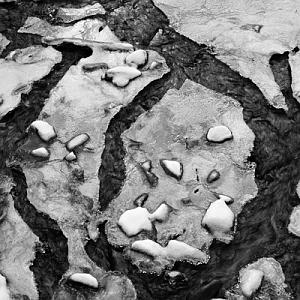 Minor White
______________________________________
Slums: The problem
Lebbeus Woods
There is much that is admirable in the way that slum dwellers struggle against overwhelming adversity, but admiration must be tempered by the realization that they do not struggle because they choose to, out of principle, or in the service of high social or political ideals, but because of their desperation at the brutal limits of survival. It is a mistake—and a grave disservice to them—to imagine that their ingenuity, resourcefulness, and capacities for self-organization can in any way serve as models for our present global society. To believe so would be to endorse the dog-eat-dog ethics that rule their lives and, all too often, those occupying society’s more economically advantaged classes. To believe so would be to endorse the most cynical and degraded vision of the human future imaginable, a throw-back to the barbarous 19th century perversion of believing in ideas such as ‘the survival of the fittest’ and ‘the nobility of poverty,’ which justified the blatant exploitation of many by a few.
The only thing we can learn from slums today is that they cannot be tolerated in any form, or under any circumstances; that poverty, their most terrible feature, must, as rapidly as possible, be alleviated; that the wealth and resources of any community—which prominently includes its human resources—cannot be controlled for the benefit of an elite, under whatever name or ideology it goes; that the survival of the emergent, global society depends on its reformation of institutions—public and private–presently managing society’s material and cultural wealth; and that reform must come not by violence from the lower social strata, but from enlightened leadership from the higher, if not the highest, strata of the social and economic structure.... (more)
via Bryan Finoki at Subtopia
______________________________________
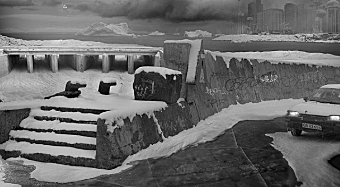 Black Ice
Anthony Goicolea
2007 ______________________________________
Toward a Photography of Love:
The Tain of the Photograph in Anne Carson's Autobiography of Red
E.L. McCallum
pmc
Today everything exists to end in a photograph.
Susan Sontag, On Photography
I'd like to ask what it means to end in a photograph, and what kind of end the photograph presents. For that matter, I'd like to interrogate the different ways of being a photograph. Will literature, too, end in a photograph or come to a photo finish? Does this end perhaps open up the form a photograph can take, complicating the truism that photography is thanatography? Might photography's end be a proliferation rather than a singular event?(...)
...before we consider what end has photography, or literature, come to in the age of the digital, I'd like to turn back and offer a palinode on the theory of the photographic image. Examining what's behind the photographic image leverages a space to consider how the verbal medium for photography might come between film and digital.... (more)
______________________________________
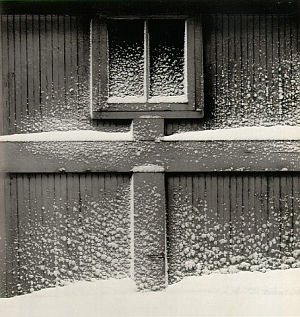 Minor White
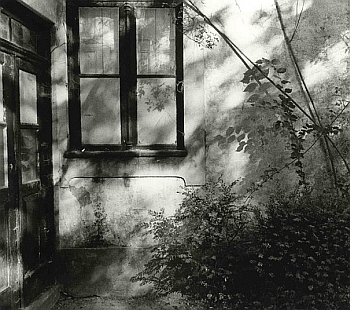 Pilar Pequeño 1 2 via la main gauche
______________________________________
The Storyteller [PDF]
Reflections on the Works of Nikolai Leskov
Walter Benjamin
Slought Foundation
Familiar though his name may be to us, the storyteller in his living immediacy is by no means a present force. He has already become something remote from us and something that is getting even more distant. To present someone like Leskov as a storyteller does not mean bringing him closer to us but, rather, increasing our distance from him. Viewed from a certain distance, the great, simple outlines which define the storyteller stand out in him, or rather, they become visible in him, just as in a rock a human head or an animal's body may appear to an observer at the proper distance and angle of vision. This distance and this angle of vision are prescribed for us by an experience which we may have almost every day. It teaches us that the art of storytelling is coming to an end. Less and less frequently do we encounter people with the ability to tell a tale properly. More and more often there is embarrassment all around when the wish to hear a story is expressed. It is as if something that seemed inalienable to us, the securest among our possessions, were taken from us: the ability to exchange experiences.
One reason for this phenomenon is obvious: experience has fallen in value. And it looks as if it is contin- uing to fall into bottomlessness. Every glance at a newspaper demonstrates that it has reached a new low, that our picture, not only of the external world but of the moral world as well, overnight has undergone changes which were never thought possible. With the [First] World War a process began to become ap- parent which has not halted since then. Was it not noticeable at the end of the war that men returned from the battlefield grown silent--not richer, but poorer in communicable experience? What ten years later was poured out in the flood of war books was anything but experience that goes from mouth to mouth. And there was nothing remarkable about that. For never has experience been contradicted more thoroughly than strategic experience by tactical warfare, economic experience by inflation, bodily experience by mechan- ical warfare, moral experience by those in power. A generation that had gone to school on a horse-drawn streetcar now stood under the open sky in a countryside in which nothing remained unchanged but the clouds, and beneath these clouds, in a field of force of destructive torrents and explosions, was the tiny, fragile human body. via ReadySteadyBlog
______________________________________
Rachel Blau DuPlessis Interviewed
Adam Fieled: Hand in hand with the intellectual rigor of your poems is a deep sense of suffering, an awareness of futility and fragility. One might see in your work a “poetics of suffering”. Just as the Buddha said “all life is suffering”, do you feel that, in some sense, all poetry must be “suffering” (or “a suffering”) too?
Rachel Blau DuPlessis: One of the fascinating things about having Drafts read is hearing about what they see in the poems. (Hearing what they see.) People’s responses construct a faceted polyhedron for me. It is also fascinating to hear what words people choose to talk about their feelings for this poem and for poetry in general. You have chosen several very freighted words to open this exchange, including using the term of the Buddha. So I have taken a deep breath, and looked at your words(“deep”; “suffering”; “futility”; “fragility”; “the Buddha”), and have re- engaged my sense of the poems. (By the way, don’t forget I am only the author of Drafts. I mean that with all the seriousness I can muster and no particular irony. What I say here to you is how best I feel at this moment and in relation to my history with the project and my agency in carrying it through. It doesn’t mean I know more about the work’s reception than you do. Readers are the ones receiving it and they can best speak to their engagement with Drafts. I am just simply the one writing it.)... (more)
Mipoesias - the Interview Issue
via Nick Piombino ______________________________________
 Wilderness Series, Canada Jacob Carter
______________________________________
"If I'm serious, and I am, the desert has driven me crazy. Not that I mind"
Edward Abbey
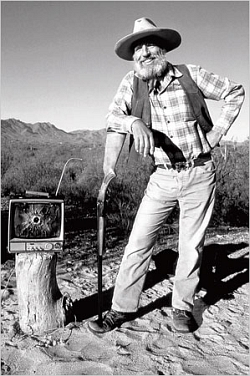 Edward Abbey
January 29, 1927 - March 14, 1989
photo - Terrence Moore
Edward Abbey's Road
Tai Moses,
In one of his most famous books, the 1968 non-fiction chronicle "Desert Solitaire," Abbey dubbed the desert "a world of light. The air seems not clear like glass, but colored, a transparent, tinted medium, golden toward the sun, smoke-blue in the shadows. The colors come, it appears, not simply from the background, but are actually present in the air itself -- a vigintillion microscopic particles of dust reflecting the sky, the sand, the iron hills."... (more)
______________________________________
Police Car, Poet, Snow
Yi Sha
Translation: Simon Patton, Tao Naikan, Michael M. Day
a poet who happened to be
trudging across the road
got splattered from head to toe
with mud thrown up by its filthy wheels
what he saw
made him suddenly felt like crying
associating what he had just witnessed
with the ambiguous connection
between this police car
of the state
and the idea that
poetry is like snow ... (more)
China Poetry International Web via
______________________________________
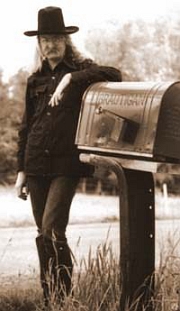 Richard Brautigan
January 30, 1935 – September, 1984 Brautigan Bibliography and Archive
I like to think
(right now, please!)
of a cybernetic forest
filled with pines and electronics
where deer stroll peacefully
past computers
as if they were flowers
with spinning blossoms.Richard Brautigan, All Watched Over by Machines of Loving Grace
______________________________________
Festival of Waste
Yi Yon-ju
Translated from the Korean by Don Mee Choi
We are discarded clocks or broken radios,
old car seat covers or umbrellas with severed frames.
We sell useless kitchenware, old gas furnaces.
We buy worn-out shoes, clothes that don't fit,
any burdensome goods.
Crinkled bills and discolored coins, we are.
Cut wire, we are.
No transmission, no reception.
Making Introductions - Don Mee Choi and Yi Yon-ju
Artful Dodge 44/45
______________________________________
Extolling Art in an Intolerable World
Adorno and Dewey on Art
John Lysaker
In Minima Moralia, Adorno offers the following. I have come to accept the darkness of its vision and the light of its insistence, and now offer it to you.The subjugation of life to the process of production imposes as a humiliation on everyone something of the isolation and solitude that we are tempted to regard as resulting from our own superior choice. It is as old a component of bourgeois ideology that each individual, in his particular interest, considers himself better than all others, as that he values the others, as the community of all customers, more highly than himself. Since the demise of the old bourgeois class, both ideas have led an afterlife in the minds of intellectuals, who are at once the last enemies of the bourgeois and the last bourgeois. In still permitting themselves to think at all in the face of the naked reproduction of existence, they act as a privileged group; in letting matters rest there, they declare the nullity of their privilege. Private existence, in striving to resemble one worthy of man, betrays the latter, since any resemblance is withdrawn from general realization, which yet more than ever before has need of independent thought. There is no way out of this entanglement. The only responsible course is to deny oneself the ideological misuse of one’s own existence, and for the rest to conduct oneself in private as modestly, unobtrusively and unpretentiously as is required, no longer by good upbringing, but by the shame of still having the air to breathe in hell. ______________________________________
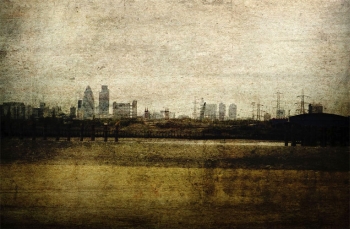 River Thames Series Jacob Carter
______________________________________
In Virtue's Cause once more exert his Rage,
Thy Satire point, and animate thy Page.
London: A Poem
In Imitation Of The Third Satire Of Juvenal
Samuel Johnson
Let such raise Palaces, and Manors buy,
Collect a Tax, or farm a Lottery,
With warbling Eunuchs fill a licens'd Stage,
And lull to Servitude a thoughtless Age.
Heroes, proceed! What Bounds your Pride shall hold?
What Check restrain your Thirst of Pow'r and Gold?
Behold rebellious Virtue quite o'erthrown,
Behold our Fame, our Wealth, our Lives your own. (...)
Prepare for Death, if here at Night you roam,
And sign your Will before you sup from Home.
Some fiery Fop, with new Commission vain,
Who sleeps on Brambles till he kills his Man;
Some frolick Drunkard, reeling from a Feast,
Provokes a Broil, and stabs you for a Jest.
Yet ev'n these Heroes, mischievously gay,
Lords of the Street, and Terrors of the Way;
Flush'd as they are with Folly, Youth and Wine,
Their prudent Insults to the Poor confine;
Afar they mark the Flambeau's bright Approach,
And shun the shining Train, and golden Coach. ... (more)
______________________________________
Our precious sets of values begin to moult; on closer scrutiny you won't see one that isn't stained with blood.
Preface to Frantz Fanon’s “Wretched of the Earth” Jean-Paul Sartre
You know well enough that we are exploiters. You know too that we have laid hands on first the gold and metals, then the petroleum of the ‘new continents’, and that we have brought them back to the old countries. This was not without excellent results, as witness our palaces, our cathedrals and our great industrial cities; and then when there was the threat of a slump, the colonial markets were there to soften the blow or to divert it. Crammed with riches, Europe accorded the human status de jure to its inhabitants. With us, to be a man is to be an accomplice of colonialism, since all of us without exception have profited by colonial exploitation.... (more)
______________________________________
A Prayer for the Traveler
Edward Abbey
May your trails be crooked, lonesome, dangerous, leading to the most amazing view. May your mountains rise into and above the clouds, May your rivers flow without end, meandering through pastoral valleys tinkling with bells, past temples and castles and poets towers into a dark primeval forest where tigers belch and monkeys howl, through miasmal and mysterious swamps and down into a desert of red rock, blue mesas, domes and pinnacles and grottos of endless stone, and down again into a deep vast ancient unknown chasm where bars of sunlight blaze on profiled cliffs, where deer walk across the white sand beaches, where storms come and go as lightning clangs upon the high crags, where something more beautiful and more full of wonder than your deepest dreams waits for you --- beyond that next turning of the canyon walls.
______________________________________
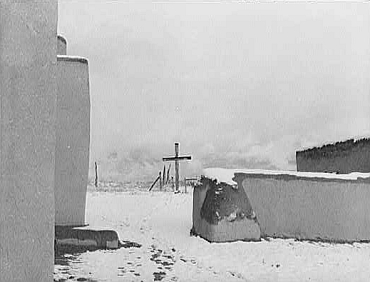 churchyard of the Penitente Miranda
Taos, New Mexico
John Collier
1943 library of congress
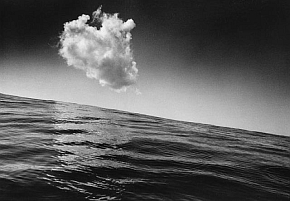 Shomei Tomatsu
______________________________________
How to Grow Clouds
It takes a lot of work: it is necessary to weed very carefully, to toss out muck and small stones by hand, to kneel on the earth, bend over, dig about in the soil, water profusely, collect caterpillars, exterminate aphids, loosen the ground and serve the earth; when your back hurts from all this and you straighten up and look at the sky, you will have the prettiest clouds. Probatum est. Philemon, or On Gardening
Karel Capek
translated by Andrew Malcovsky
Fables and Understories
Andrew Malcovsky
A fun, occasionally loose translation of Karel Capek's Bajky a podpovídky (1946), a posthumous collection of the author's short pieces, mostly drawn from the newspaper Lidové noviny.
______________________________________
Cabinet of Curiosities
Ashley VanDoorn
........
Long flutes & fruits Dried As their tree Beans Little Red or
Black In their Cods with what flower & seed Can be Gotten the flowers Laid Between
paper leaves In a Book Dried..." can unlock progressively the
ebony half of four sets of external doors which fold out
vertically and the two cloaked in semi-precious stones which fan
horizontally into frames to form additional latched
showcases, embellished with oak, agate, onyx, enamel,
miniature portraits
that taken down and
turned upside down turn
into grinning skulls.
"How divine," fanning
myself, "to first enter the estate, enter the frontispiece, enter the chamber
depicted on the overleaf, enter the cabinet, enter the drawer, enter
the box, enter, finally, the object held out for inspection¡ " Now-exposed do
these recesses vault and tier you? On the margins of the charted are you contained,
extended?
... (more)
Two Poems
Ashley VanDoornLa Petite Zine #21
______________________________________
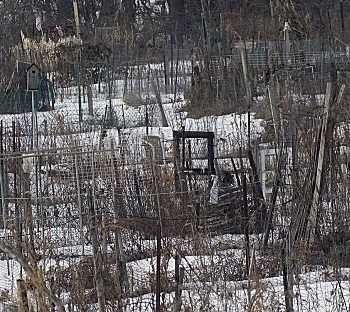 detail
photo - Paula's House of Toast full size Conversion
Paula's House of Toast
Even in winter -- maybe especially in winter -- the community garden yields a rich crop of images. The going is tough between the little, fenced-in plots: boot-pocked snow, frozen slick and solid on the surface, collapses under my weight, and my gyroscope is in overdrive. The tangled remnants of plants, both cultivated and wild, weave through and overtop lopsided walls of wood and wire. I stop to rewind my scarf. I am a refugee in an abandoned shantytown.... (more)
______________________________________
Esther Leslie interview
Mark Thwaite
The Book Depository
Benjamin seems to be an exemplary example of somebody whose writings transport into futures, some of which he imagined, others not, and the writings become in his own phrase 're- actualised'. It is this ever-present relevance that means I wrote about him for my PhD, published a book on him some 5 years later, used his ideas to address the very different themes of animation and synthetics chemistry in two more books, translated a volume of his writings and, now, have written a biography.(...)
Effectively he changes our relationship to our world because what he writes is a kind of theory of experience, a bringing to consciousness of the historical determinations on our modes of seeing. In s doing, he expands our experience, by allowing us to reflect on our historical moment and that of those who preceded us. He existed in a period of immense technological change, followed by horrendous political oppression. These factors impelled an urgency on his theory, which is written from the perspective of somebody who believes in the urgent necessity of social change. While factors do not add up in the same way for us today - technological change continues apace, political oppression is either diffuse or displaced from our immediate European home - the tendencies that brought about human catastrophe have not disappeared. To that extent Benjamin functions as an analyst and (in one of his own images) an alarm clock for us all today.... (more)
The scrap merchant supremePeter Conrad reviews Walter Benjamin's Archive: Images, Texts, Signs, translated by Esther Leslie ______________________________________
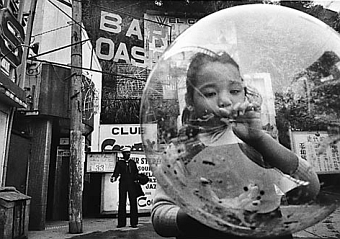 Chewing Gum and Chocolates
Yokosuka, 1959
Shomei Tomatsu 1 2 3
______________________________________
"Snow Bed"
Paul Celan
translated by Michael Hamburger
Eyes, world-blind, in the fissure of dying: I come,
callous growth in my heart
I come.
Moon-mirror rock-face. Down.
(Shine spotted with breath. Blood in streaks.
Soul forming clouds, close to the true shape once more.
Ten-finger shadow, clamped.)
Eyes world-blind,
eyes in the fissure of dying,
eyes eyes:
The snow-bed under us both, the snow-bed.
Crystal on Crystal,
meshed deep as time, we fall,
we fall and lie there and fall.
And fall:
We were. We are.
We are one flesh with the night.
In the passages, passages.
______________________________________
 abandoned hematite mine
Marmora
photo - mw ______________________________________
Coups Noirs
No atrocity or horrid event
from the past can equal the
ghastly enactments stored
in the future: In fact the
worst horrors of the past
were once the future
*
The light carries darkness
in its pocket.
Low Coups And Haut Coups
Ed Dorn
In Remembrance of Ed Dorn
Big Bridge
 Dead Tree
Anthony Goicolea more at
Galerie Aurel Scheibler via
______________________________________
from
What Speaks?
latest draft
Tom Beckett
chiaroscuro metropoli....
(S)he thought the Ventriloquist understood the word "overheard" to
mean something akin to "written over," as in "written on top of"--in
terms that is of a kind of layering of utterances.
According to the Ventriloquist, I found my structure in you. A world
of sounds composed only of weather.
I am a fiction
Called the Old Man
At the Scene
Of the Rhyme.
Venetian blinds
Ladder shadows.
Reality is never
Completely realized
But its drafts
Make oneShiver. ... (more)
______________________________________
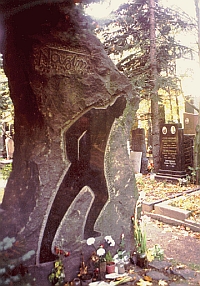 Nazim Hikmet
Turkish poet, playwright, novelist, memoirist
1902 - 1963
The Nazim Hikmet Ran Archive
A Sad State Of Freedom
You waste the attention of your eyes,
the glittering labour of your hands,
and knead the dough enough for dozens of loaves
of which you'll taste not a morsel;
you are free to slave for others-
you are free to make the rich richer.
The moment you're born
they plant around you
mills that grind lies
lies to last you a lifetime.
You keep thinking in your great freedom
a finger on your temple
free to have a free conscience.
Your head bent as if half-cut from the nape,
your arms long, hanging,
your saunter about in your great freedom:
you're free
with the freedom of being unemployed.
You love your country
as the nearest, most precious thing to you.
But one day, for example,
they may endorse it over to America,
and you, too, with your great freedom-
you have the freedom to become an air-base.
You may proclaim that one must live
not as a tool, a number or a link
but as a human being-
then at once they handcuff your wrists.
You are free to be arrested, imprisoned
and even hanged.
There's neither an iron, wooden
nor a tulle curtain
in your life;
there's no need to choose freedom:
you are free.
But this kind of freedom
is a sad affair under the stars.
Nazim Hikmet
Translated by Taner Baybars
______________________________________
The new tyranny, like other recent ones, depends, to a large degree, on a systematic abuse of language. Together we have to reclaim our hijacked words and reject the tyranny’s nefarious euphemisms; if we do not, we will be left with only the word shame.
This is written in the night. In war the dark is on nobody’s side, in love the dark confirms that we are together.
- John Berger
______________________________________
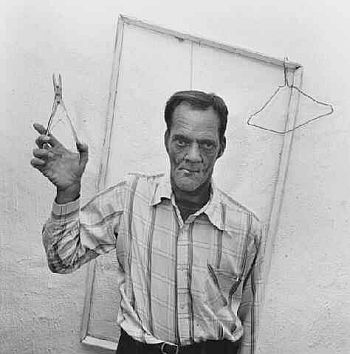
Handyman
Roger Ballen 1 2 3 4 5 A Conversation with Roger Ballen
Jörg Colberg
______________________________________
Secrecy and Manhood
A political romance
Joseph S. Bonica
... the persistence of the secret as the Bush administration's central organizational strategy, despite constant threats of investigation by Congress and the press, might suggest something more at work than the practical logistics of hiding embarrassing facts. Looking at the president's almost reflexive reliance on "confidence" as the yardstick of patriotic commitment—confidence in Donald Rumsfeld, in Alberto Gonzales, in Dick Cheney and his staff—reveals another level of motivation, another modality of patriotism, another political tradition embedded in the secret. For it was in the supreme value of men's "sacred confidence" (from con fides, "with trust") that an early national generation of big-government conservatives asserted themselves, declaring to an often distrustful populace that men's secrets were not only defensible but constituted the very measure of the virtuous man. In the energetic vindications of secret societies that erupted after the Revolution; in the closed doors of the 1787 Constitutional Convention; and in the contractual agreements between men, which constituted the only positive right of citizenship until the twentieth century—the partisans of men's confidence unfolded a vision of the patriotic republic in the intimate spaces between men. To be sure, their audacious claims jarred mightily with the prevailing understandings of secrecy as particularly unmanly and effeminate—cultural notions of the secret that played a pivotal role in uniting revolutionaries in self-consciously manly purpose; it should be no wonder, then, that an emerging anti-federalist opposition would pounce on the delegates to the cloistered Philadelphia convention as debased, fleshy, weak, and womanly, "harpies of power . . . inebriated with the lust of dominion." And indeed, the unmanly, sexually inverting secret echoes in some of Bush's more creative critics, finding in Bush's Skull and Bones Society days the origin of a lifelong effort to obfuscate his alleged schoolboy predilections for homoerotic Satan worship. But for the persistent advocates of disciplined diffidence, the secret did not unman men or even isolate them. It made them, almost incomprehensibly to many, republican men, realizing a manly virtue in the simple and transparent capacity of one man to assess another, to "look into his eyes"—as George W. Bush assessed Vladimir Putin at their first private meeting—and "get a sense of his soul."... (more) Common-place - January 2008______________________________________
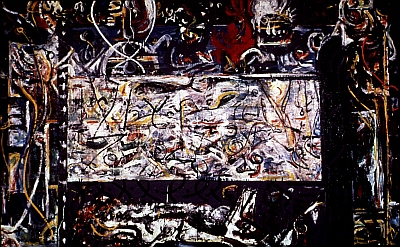 Guardians of the Secret
Jackson Pollock
Jan 28 1912 - Aug 11 1956
 woods boys treed
c. 1957 ______________________________________
Lethean Lock Mnemonic Key
Don Domanski
forgetfulness is the weight
of a pigeon landing in the park
forgetfulness is a slight sobbing
just ahead of the wind
when I walk
I measure out the spaces
between forgetting
and those spaces
line up nicely
like mine shafts
down into coal deposits
which smell of late-night taverns
and complete success
at sitting alone (...)
in old paintings it was always
represented as the beautiful child
with a broad leaf
for a mother's lap
in its chubby hands
there was always a black key
a key that opened the lock of memory
I've never seen that lock
but I'm sure
it's made
of flesh and bone
I know there's a little darkness waiting there
to be manipulated by the key
two tumblers waiting
to be spun round
like two sleeping heads
who suddenly wake
stare into each other's eyes
and turn away. ... (more)
All Our Wonder Unavenged Don Domanski brick books Governor General’s literary award for poetry.
______________________________________
0 my friends, there is no friend." In addressing you in this way, perhaps I have not yet said anything. Perhaps I have not even addressed myself to you. Not only because the two parts of this sentence, on the one side and on the other side of a comma or a pause, seem incompatible with each other, destined to annihilate themselves in their contradiction, but mainly because I have not yet said anything in my own name. I have contented myself with quoting. Spokesman for another, I have reported his words, which belong to a foreign or perhaps somewhat archaic language. I have, then, signed nothing, booked nothing to my own account."0 my friends, there is no friend." This is not merely a citation which I am reading at present; it was already the quotation by another reader of the country I come from, Montaigne, "it is a saying which," he says, "Aristotle was used to repeating."' In other words, I have quoted the quotation of a saying already quoted by Aristotle, a saying whose origin seems to lose itself in the anonymity of time immemorial. Nonetheless, it is not one of those proverbs without an assignable origin, and whose aphoristic mode rarely takes the form of an apostrophe.
The Politics of Friendship
Jacques Derrida
The Journal of Philosophy, Vol. 85, No. 11,
download available here
cross-x
.....................................................................
Acts of Literature
Jacques Derrida
full text download
.....................................................................
6 essays on Derrida
Christopher Wise - Deconstruction and Zionism
Christopher Wise - Saying "Yes" To Africa
Nicole Anderson - The Ethical Possibilities of the Subject as Play In Nietzsche and Derrida
John P. McCormick - Derrida on Law, Or, Poststructuralism Gets Serious
Michael Naas - Jacques Derrida and the Question of Hospitality
Puspa Damai - Messianic-City - Ruins, Refuge and Hospitality in Derrida
______________________________________
 photo - mw ______________________________________
At the innermost circle of the work: the handwritten line.
Handwriting as a Form of ProtestCaroline Bergvall reviews Fiona Templeton's Cells of Releasejacket
For six weeks, in 1995, the poet and performer Fiona Templeton locked herself up in the lugubrious corridors of the abandoned Eastern Penitentiary of Philadelphia to write. Why would she do this? Why would one do this? But this she did, “over six weeks”, writing by hand with an indelible marker, no return no edit, “I wrote without the possibility of erasure”, on one long string of paper, “where a spool of paper ran out, I sewed on the next one”, guiding it through one prison cell per day, and for as long as it would take to work through the thirty-eight cells that make up this one corridor of the dreadful panopticon. Once the project completed, she summarised it in this way: “written onsite / a continuous line / a cell a day”. To work for weeks within the walls of an abandoned prison, everyday, alone, certainly demonstrates mental stamina and an engagement with materials and ideas at a physical as much as at a discursive level. But what kind of claim on textual practice is Templeton making through the long hours of her writing body?.(...)
Ironically, it is through the photos that one becomes aware of the singleness of her poetic line. In the book, the line travels down the centre of the page in short interrupted bursts, and turning the page creates interruptions and pauses. It is the photos that follow the handwritten line, the tracing of the text as it makes its way along the cells. The photographed line of text is pinned on the prison site, weaves a line of writing, a line of work in and out of the cells. There are no close-ups of the text. The photos are all taken mid-shot. From this distance, the actual line of text is not readable. It is viewable but largely unreadable. Photographed in this way the handwritten text belongs to the site, is a part of the site. The photos give credence to the veracity of the torturous task of writing.... (more)
______________________________________
Declaration of Ink Dependence
Neil Badmingto
I have written at length in another context about the significance of the many ‘ink blots’ that are spilled across the work of Roland Barthes. I will not, therefore, reopen that particular ink quest in detail here, but I do want briefly to address why such apparent trivialities matter. Immediately after telling Jean-Louis de Rambures that discussing writing habits is usually seen as ‘futile’, Barthes makes a comment that explicitly links the topic in question to the work that he had begun in Mythologies:
When a great many people agree that a problem is insignificant, that usually means it is not. Insignificance is the true locus of significance. This should never be forgotten. That is why it seems so important to me to ask a writer about his writing habits, putting things on the most material level, I would even say the most minimal level possible. This is an anti-mythological action: it contributes to the overturning of that old myth which continues to present language as the instrument of thought, inwardness, passion, or whatever, and consequently presents writing as a simple instrumental practice.
A caustic resistance to the idealist, pre-Saussurean understanding of language leaves its mark upon many of Barthes’ writings, of course. What texts like ‘An Almost Obsessive Relation to Writing Instruments’ and ‘Variations sur l’écriture’ add, however, is the proposition that attending to the materials and the material act of inscription contributes to the wider inking-out of the idyll of idealism. There is no head that is filled before the emptying movement of the hand.
As one who shares Barthes’ almost obsessive relation to writing instruments and his related contempt for idealism, I have high hopes that Writing Technologies will continue his ‘anti-mythological action’ by ‘putting things on the most material level possible’ whenever writing is at hand.... (more)
Writing Technologies ______________________________________
 The Morning of Life
Samuel Palmer
27 January 1805 - 24 May 1881
______________________________________
Pleasure, Change, and the Canon [PDF]
Frank Kermode
There was a time when discussion of canons was angry but simple in the manner of Dr. Leavis: should Milton be dislodged, or Shelley saved from demotion to the apocrypha? These arguments were keenly, even passionately conducted, but beneath them was a general agreement that getting the canon right was a social issue, though determined by aes- thetic argument; it was rarely or never suggested that the entire canon, whatever its members, should be decanonized. The debate turned on such matters as Milton's grand style or Shelley's reprehensible vague- ness. It was more or less silently abandoned when such considerations had come to seem chimerical, the real questions being whether the no- tion of canon wasn't a wicked myth, designed to justify the oppression of minorities--a political propaganda weapon now at last revealed as such and, as the word goes, "demystiSed." Questions of literary value were for the most part set aside as without relevance or even derided as demonstrable nonsense.(...)Having grown old, I have had the inescapable fate of living and working under both dispensations. I have written about canons, and about many other things, with double vision and tried to take part in controversies of both kinds, the old one about dislodgment or insertion, the new one about the canon as an abuse of power. And as Chateaubriand said in the Mémoires d'Outretombe, "If I compare the two terrestrial globes, the one I knew at the beginning of my life and the one I now behold at the end of it, I no longer recognise the one in the other." .....................................................................
Omnes et Singulatim: Towards a Criticism of `Political Reason' [PDF]
Michel Foucault The relationship between rationalisation and the excesses of political power is evident. And we should not need to wait for bureaucracy or concentration camps to recognize the existence of such relations. But the problem is: what to do with such an evi- dent fact ? .....................................................................
The Tanner Lectures on Human Values______________________________________
 Geisha in Winter
Unknown
c.1880
albumen photographs
history, science and preservation
______________________________________
Alpha Poet
Dan Chiasson on Zukofsky
His reputation rests today partly in the hands of the so-called Language poets, who find in Zukofsky’s brilliant subversions of syntax, word games and indeterminacy (his poem, after all, is called “A,” not “The”) an augury of their own methods. But “A” is not about anything as simple as “language” or “life”: it is a poem about working on “A” — about the daily elations and impediments of an artist who sought, over the course of decades, to make something really hard really good. Since it takes its own composition as the measure of living, it is a more personal poem, and often a more moving one, than either of its main models, Pound’s “Cantos” or William Carlos Williams’s “Paterson.”... (more)
______________________________________
 photo - mw
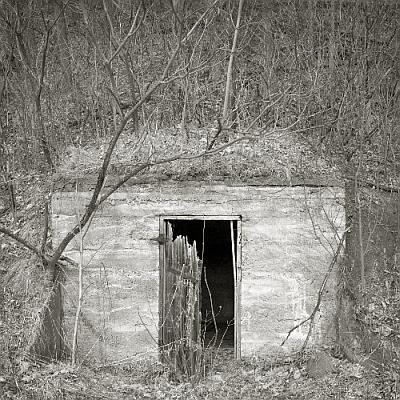 Beth Dow
via la main gauche
______________________________________
The Rise of Capitalism
Donald Barthelme
The first thing I did was make a mistake. I thought I had understood capitalism, but what I had done was assume an attitude -- melancholy sadness -- toward it. This attitude is not correct. Fortunately your letter came, at that instant. "Dear Rupert, I love you every day. You are the world, which is life. I love you I adore you I am crazy about you. Love, Marta." Reading between the lines, I understood your critique of my attitude toward capitalism. Always mindful that the critic must "studiare da un punto di vista formalistico e semiologico il rapporto fra lingua di un testo e codificazione di un -- " But here a big thumb smudges the text -- the thumb of capitalism, which we are all under. Darkness falls. My neighbor continues to commit suicide, once a fortnight. I have this suicides geared into my schedule because my role is to save him; once I was late and he spent two days unconscious on the floor. But now that I have understood that I have not understood capitalism, perhaps a less equivocal position toward it can be "hammered out." My daughter demands more Mr. Bubble for her bath. The shrimp boats lower their nets. A book called Humorists of the 18th Century is published.(...)
Smoke, rain, abulia. What can the concerned citizen do to fight the rise of capitalism, in his own community? Study of the tides of conflict and power in a system in which there is structural inequality is an important task. A knowledge of European intellectual history since 1789 provides a useful background. Information theory offers interesting new possibilities. Passion is helpful, especially those types of passion which are non licit. Doubt is a necessary precondition to meaningful action. Fear is the great mover, in the end.... (more)
Donald Barthelme's barthelmismojessamyn ______________________________________
Fullblown Panic
James Howard Kunstler
Knees knocked last week from sea to shining sea as the shape-shifting monster of economic reality cut a swathe of destruction through the markets and financial ranks. The exact nature of this giant beast still remained largely concealed in a fog of accounting gambits, policy blusters, and reporting dodges, but a few intrepid scouts who glimpsed the behemoth up close said it looked like Godzilla with Herbert Hoover's face.
George W. Bush, tried to appease the beast by offering each American adult the dollar equivalent of half a month's mortgage payment -- with the exhortation to drive forthwith to the nearest WalMart and blow it on salad shooters and plasma TV's -- but Hooverzilla just laughed at the offering and pounded the equity markets further into the dust of loss, while the "bank-like" guardians of wealth lay in the drainage ditches bleeding from their ears and eyes.... (more) ______________________________________
What makes a biopolitical space?
A discussion with Toni Negri
eurozine
The biopolitical diagram is the space in which the reproduction of organised life (social, political) in all its dimensions is controlled, captured, and exploited – this has to do with the circulation of money, police presence, the normalisation of life forms, the exploitation of productivity, repression, the reining in of subjectivities. In the face of this, there is what I call a "political diagonal", in other words the relation that one has with these power relations, and which one cannot but have. The problem is to know what side you are on: on the side of the power of life that resists, or on the side of its biopolitical exploitation. What is at stake in the city often takes shape in the struggle to re-appropriate a set of services essential to living: housing; water, gas and electricity supply; telephone services; access to knowledge and so on.(...)
...a biopolitical space, like the city, is a space of mixture, of encounter, and above all of intellectual, political and ethical expression. One must imagine this exactly as one has always considered language, or the building of wealth: as accumulation. But accumulation that is more than the simple accrual of parts. Creation is not an act of genius, and certainly not something individual, or something that belongs only to avant-gardes. This is why, for example, copyright is always deeply arbitrary and almost criminal: it is an act of appropriation at the expense of a common multitudinous reality.... (more)
______________________________________
Light touches – text messaging, intimacy & photography
Matt Locke on Andrew Wilson's Text Messages
Text messages ... carry a tactile quality. Like the photograph, the text message is a kind of pointing, saying 'I am here' or 'look at this'. Texting is also an accumulation of light touches – presses on a keypad rather than the click of a camera shutter. Even more, text messages often arrive with a tactile sensation, a vibration that acts like a tap on the shoulder. (...)
Wilson's poems introduce the kind of intimacy that could not be captured in images. Like photography, texting acts as a mechanical record, a message saying 'I am here' or 'look at this'. But texting also gives space to intimate, private languages that are impossible to capture on the public surface of the photograph. The vernacular grammar of text messaging developed partly as a response to its limitations, but also to its intimacy, mimicking the childish languages of lovers. The text message is a note slipped from hand to hand in a classroom, a secret rather than an announcement.... (more) via Purse Lip Square Jaw
Interview With Andrew Wilson
Everyday words about everyday lives
Text message poet Andrew Wilson offers advice on capturing that luminous detail
Guardian
______________________________________
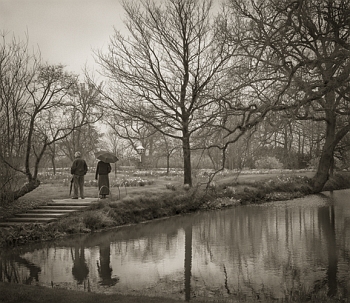 The Moat, Sissinghurst
Beth Dow
______________________________________
I wish that a narration were possible. For the moment it is not possible. I dream of managing one day not to recount this legacy, this past experience, this history, but at least to give a narration of it among other possible narrations. But in order to get there, I would have to undertake a kind of work, I would have to set out on an adventure that up till now I have not been capable of. To invent, to invent a language, to invent modes of anamnesis ... For me, it is this adventure that interests me the most in a certain way, but which still today seems practically inaccessible.(...)
... a récit is not simply a memory reconstituting a past; a récit is also a promise, it is also something that makes a commitment toward the future. What I dream of is not only the narration of a past that is inaccessible to me, but a narration that would also be a future, that would determine a future. Jacques Derrida, Points...: Interviews, 1976-93 , courtesy of Spurious
______________________________________
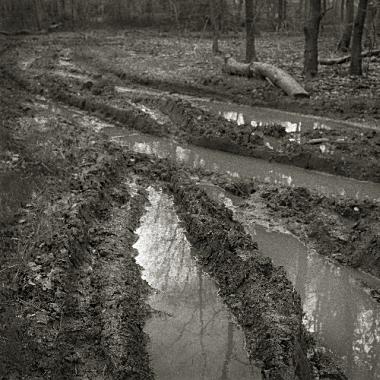 Beth Dow
 early morning
waiting for the coffee shop to open
photo - mw ______________________________________
There is a tendency in recent scholarship, it seems to me, to proceed from what we might call a vulgar historicism, as if to want to promulgate a certain imperative that thinkers from the same place and time be of and about the same core cultural patterns, as if working towards a singular and coherent frame that is guaranteed by the historical predicament of their writing.
But writing is a solitary business and there is no such guarantee: place is as much a pragmatic as writing itself. These two might have sat in the same cafés, spoken with mutual friends, eaten in the same restaurants and fucked the same women. But, in the end, it is all something else, something other than THIS proposed relation, the relation that is not one.
No way in, no way out...
- blah-feme, Between Levinas and Lacan... there is space
______________________________________
gesshom
Assent 25
Tom Hibbard
shampoo
the trees’ secret message
indecipherable winds
cannot legally be claimed
I’m not sure I know
why perfected stars shine
you can’t alter what I am
you have forged the name
of the judge of letters
your telescope showing sleepy half moons
glistening off wavelets
in the lagoon’s cooling breeze
overstated news making me miss
the cove of hope
the dainty litigation
that breaks rude pots
lit palely by a well-trained chorale
... (more)
Assent 19
Tom Hibbard
The Miracle Of The Birds
Tom Hibbard
otoliths
2 poems in eratio .....................................................................
Place of Uncertainty
Tom Hibbard otoliths / lulu
The Otoliths Storefront
Otoliths
edited by Mark Young
______________________________________
the nature of flows
Gilles Deleuze
Translated by Karen Isabel Ocaña
...who has shown this in a most vital and convincing way if not Beckett, whose strange creatures spend their time decoding things, they make non-codable flows pass. Social processes can't capture flows except in relation to codes which operate on them, and which are simultaneously a detachment of a flow and a subtraction of chains or codes, and the madman makes flows pass on it, flows from which it is no longer possible to detach anything; there are no more codes, there is a chain of decoded flows, but one can't cut into it. There is a sort of deluge or failure of the body, maybe that's it, after all, the body-without-organs, when on the body, or from the body flows enter and exit by way of poles, flows on which one can no longer carry out any subtraction because there are no longer any codes from which to detach anything. (...)
One long stream that cannot be tamed, where all of the flows that are usually distinguished by their codes are united in one and the same indivisible flow all flowing on one and the same non-differentiated body, the body without organs. And as for the mad patient who has undergone an operation, every breath of air he takes is at the same time a breath of spittle, a flow of air and spit that tend to get mixed up together, so that there are no longer any distinctions. Moreover, each time that he breathes and spits, he feels a vague desire to defecate, a vague erection: it's the body-without-organs that escapes on every side. It is sad, but then again, it has moments of great joy, mixing up all the codes, it has its great moments, and this is what makes Beckett a comic writer.... (more)
______________________________________
 Syrie Kovitz
______________________________________
Trouble With Time
Robert Gibbons
That in itself would offer a brief insight into the matter: the trouble with Time spent on writing continuously separate from money. We were exhausted, perhaps even exhausting each other trying to figure out how to live, live, as poet & wife, both curses, which Creeley linked with death. Where to find a roof, four walls, & a few windows in this day & age, when one percent of the population owns most of this crude, architecturally crass, second-home-strewn culture? Not a lot to ask: an affordable rent where we don’t have to fear rodents & rapists! But no ...... (more)
Beyond Time
Robert Gibbons
(with photography by Syrie Kovitz)
Beyond Time Reviewed by Bent Sørensen
His poetics, never disembodied or vapidly spiritual, suggests the tactile quality of language. Words caress you or may be caressed as bodies do and are. Words are therefore all we have and all we are, but they are never enough: “I’d film words like Godard, if I could, chant like Coltrane, if need be paint a sign like Kline,” Gibbons states. The poems bear this out in their flow of sounds and images referred to, described, alluded to, suggested, created anew.(...)
The burst of language in the prose is violent, flowing with great energy and speed as a molten lava mass from the core – only to end up a suspended, shimmering substance captured on the page or screen, inert, but upon reading, becoming unstuck in time again, speeding into the reader’s mind. “Speed of language counts. Prose speeds.” Gibbons is utterly committed to spontaneity, to the improvisation that knows not where it is going to end “until last tap at keyboard”.... (more)
______________________________________
 photo - mw ______________________________________
Apocalyptic Landscape
Tom Hibbard
vizbilla's disconsolate bride
dressed in the ski mask of zero tolerance
dressed in Santa Eugenia's religious shrapnel
dressed in the black ribbon of form
fourteen-year-old condemning Earthjustice
in homeland schoolrooms
responsible might mean deliberate
disassociational targets
some three hundred thousand in one day
Redfern Australia rioting
numbly awaits elegant chair covers
3 poems
Tom Hibbard
otoliths
 classification yards
Chicago and Northwestern Railroad
Jack Delano .....................................................................
Library of Congress on Flickr
1930s-40s in Color
1615 photos
News in the 1910s
1500 photos
______________________________________
Studio
Studio introduces established and new poets, translators, and writers to a large, on-line, global readership. Studio is supported collaboratively by Faculty of Education, University of British Columbia, Faculty of Education, Faculty of Arts, and Department of English, York University.
.....................................................................
The First Time
Robert Gibbons
So, so much world, that the internal must be vast to match it. Blank pages, which I love, & keep around, in fact two new notepads from Sally Wigon on Free Street, & the last three black pens to etch my hand like a primitive blowing ochre signatures on a cave wall. The blank page Godard calls the image of man.... (more)
.....................................................................
Robert Gibbons also has some work (pdf) in the current Janus Head ______________________________________
Edward Dorn: A World of Difference
Tom Clark
Google Books
______________________________________
A Book of Prophecies
John Wieners
Reviewed by Ron Silliman
______________________________________
Sweet fallout
Philip Whalen’s word bombs
William Corbett looks at The Collected Poems of Philip Whalen, edited by Michael Rothenberg
______________________________________
Foucault etexts
Continental Philosophy
Security, Territory, Population Madness and Civilization 3 volumes of History of Sexuality
______________________________________
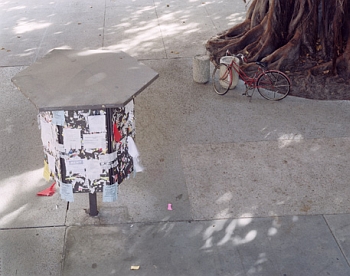 Billboard and Tree
The Outernet
Tim Davis
______________________________________
'The Photographs Not Taken'
Collected By Will Steacy
...a collection of essays by photographers about the times they didn't use their camera. This collection is a series of photographs not taken with a camera, but, instead, lived and remembered.
______________________________________
...for those of us who are not suffering from the blasé attitude, who are very conscious of the reality of the people we encounter, why do we look away embarrassed or scared, rather than gently, politely, in good conscience?
Stealing glancesSheila Heti That walking among others should present itself as a dilemma is pathetic. Perhaps it is because we are primarily a culture of drivers, not pedestrians. Even if we do not drive, still we share the streets with many who do, who do not occupy the sidewalks with pleasure but rather are wishing there was less space to travel between the restaurant and their parked car. "Urbanity and automobiles are antithetical in many ways," writes Rebecca Solnit in Wanderlust, a history of walking. "A city of drivers is only a dysfunctional suburb of people shuttling from private interior to private interior." This is also true in a city of transit users - we rush to the streetcar stop, take a seat, look through whatever newspaper is lying closest. Walking is no longer, as Solnit points out, "a state in which the mind, the body, and the world are aligned." As a result, we are jarred by our encounters. Eye contact is an irritation. It disrupts the work of getting somewhere.
Most of us accept as inevitable the sort of eye contact that is most pervasive, that rushed and fearful glance. You might argue that this way of looking is respectful; that since privacy is so scarce in a city, it is gracious to look away. But I have experienced such gentle looks away - giving them, getting them - and they're not what I am talking about and not the norm. There still remains that quick glance away, which often leaves me with a feeling of shame or a sense of the diminishment of my humanity. And as I sweep my eyes rapidly from someone's face onto the mailbox, I recognize that, in my wake, I may leave that person with this same anxiety. ... (more)
______________________________________
 Herman A. "Germany" Schaefer
(1877-1919)
the millionth item scanned
Prints & Photographs Division
Library of Congress
______________________________________
A Tale of Two Anti-Americanisms
Pierre Guerlain
European Journal of American Studies via The Atlantic Community
Transatlantic Perspectives on America
______________________________________
Religion, European secular identities, and European integration
José Casanova
eurozine
The most interesting issue sociologically is not the fact of progressive religious decline among the European population, but the fact that this decline is interpreted through the lenses of the secularization paradigm and is therefore accompanied by a "secularist" self-understanding that interprets the decline as "normal" and "progressive", that is, as a quasi-normative consequence of being a "modern" and "enlightened" European. It is this "secular" identity shared by European elites and ordinary people alike, that paradoxically turns "religion" and the barely submerged Christian European identity into a thorny and perplexing issue when it comes to delimiting the external geographic boundaries and to defining the internal cultural identity of a European Union in the process of being constituted.
I would like to explore some of the ways in which religion has become a perplexing issue in the constitution of "Europe" through a review of four ongoing controversial debates: the role of Catholic Poland, the incorporation of Turkey, the integration of non-European immigrants, and the place of God or of the Christian heritage in the text of the new European constitution.... (more)
______________________________________
 Hat Shop
Black River Falls
Charles Van Schaick Wisconsin Historical Images
flickr
(485 photos)
______________________________________
The Kingness of Mad George
The roots of the current debate over presidential power
Jeffrey L. Pasley
Bush and Cheney's views and actions seem quite breathtakingly dangerous. There have likely been absolute monarchs whose lawmaking was more procedurally constrained than that of the present administration.
______________________________________
Beware of thinkers whose minds function only when they are fueled by a quotation.
-
E.M. Cioran
via
______________________________________
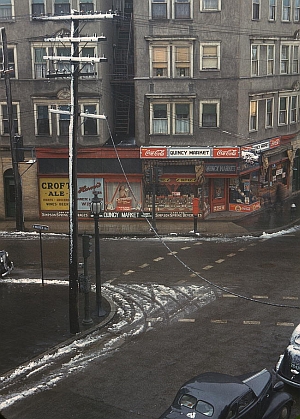 Street corner
Brockton, Mass.
Jack Delano
1941
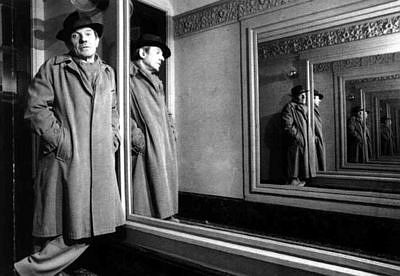 Gilles Deleuze
January 18, 1925 - November 4, 1995
How do you make yourself a body without organs?
from A Thousand Plateaus
Deleuze and Guattari
You have to keep enough of the organism for it to reform each dawn; and you have to keep small supplies of signifiance and subjectification, if only to turn them against their own systems when the circumstances demand it, when things, persons, even situations, force you to; and you have to keep small rations of subjectivity in sufficient quantity to enable you to respond to the dominant reality. Mimic the strata. You don't reach the BwO, and its plane of consistency, by wildly destratifying.(...)
The BwO is desire; it is that which one desires and by which one desires. And not only because it is the plane of consistency or the field of immanence of desire. Even when it falls into the void of too-sudden destra-tification, or into the proliferation of a cancerous stratum, it is still desire. Desire stretches that far: desiring one's own annihilation, or desiring the power to annihilate. Money, army, police, and State desire, fascist desire, even fascism is desire. There is desire whenever there is the constitution of a BwO under one relation or another. It is a problem not of ideology but of pure matter, a phenomenon of physical, biological, psychic, social, or cosmic matter. That is why the material problem confronting schizoanalysis is knowing whether we have it within our means to make the selection, to distinguish the BwO from its doubles: empty vitreous bodies, cancerous bodies, totalitarian and fascist. The test of desire: not denouncing false desires, but distinguishing within desire between that which pertains to stratic proliferation, or else too-violent destratification, and that which pertains to . the construction of the plane of consistency (keep an eye out for all that is fascist, even inside us, and also for the suicidal and the demented). The plane of consistency is not simply that which is constituted by the sum of all BwO's. There are things it rejects; the BwO chooses, as a function of the abstract machine that draws it. Even within a BwO (the masochist body, the drugged body, etc.), we must distinguish what can be composed on the plane and what cannot. There is a fascist use of drugs, or a suicidal use, but is there also a possible use that would be in conformity with the plane of "consistency? Even paranoia: Is there a possibility of using it that way in part? ... (more)
.....................................................................
A Thousand Plateaus
capitalism and schizophrenia Deleuze Guattari Translation by Brian Massumi
searchable OCRed pdf via cross-x
Foreword by Brian MassumiThis is a book that speaks of many things, of ticks and quilts and fuzzy subsets and noology and political economy. It is difficult to know how to approach it. What do you do with a book that dedicates an entire chapter to music and animal behavior—and then claims that it isn't a chapter? That presents itself as a network of "plateaus" that are precisely dated, but can be read in any order? That deploys a complex technical vocabulary drawn from a wide range of disciplines in the sciences, mathematics, and the humanities, but whose authors recommend that you read it as you would listen to a record?
"Philosophy, nothing but philosophy." Of a bastard line.
The annals of official philosophy are populated by "bureaucrats of pure reason" who speak in "the shadow of the despot" and are in historical complicity with the State. They invent "a properly spiritual... absolute State that ... effectively functions in the mind." Theirs is the discourse of sovereign judgment, of stable subjectivity legislated by "good" sense, of rocklike identity, "universal" truth, and (white male) justice. "Thus the exercise of their thought is in conformity with the aims of the real State, with the dominant significations, and with the requirements of the established order." .....................................................................
There is too much to say, yes, about the time I was given, along with so many others of my "generation," to share with Deleuze; about the good fortune I had of thinking thanks to him, by thinking of him. Since the beginning, all of his books (but first of all Nietzsche, Difference and Repetition, The Logic of Sense) have been for me not only, of course, provocations to think, but, each time, the unsettling, very unsettling experience - so unsettling - of a proximity or a near total affinity in the "theses" - if one may say this - through too evident distances in what I would call, for want of anything better, "gesture," "strategy," "manner": of writing, of speaking, perhaps of reading. As regards the "theses" (but the word doesn't fit) and particularly the thesis concerning a difference that is not reducible to dialectical opposition, a difference "more profound" than a contradiction (Difference and Repetition), a difference in the joyfully repeated affirmation ("yes, yes"), the taking into account of the simulacrum, Deleuze remains no doubt, despite so many dissimilarities, the one to whom I have always considered myself closest among all of this "generation." I never felt the slightest "objection" arise in me, not even a virtual one, against any of his discourse, even if I did on occasion happen to grumble against this or that proposition in Anti-Oedipus(I told him about it one day when we were coming back together by car from Nanterre University, after a thesis defense on Spinoza) or perhaps against the idea that philosophy consists in "creating" concepts. One day, I would like to explain how such an agreement on philosophical "content" never excludes all these differences that still today I don't know how to name or situate. (Deleuze had accepted the idea of publishing, one day, a long improvised conversation between us on this subject and then we had to wait, to wait too long.) I only know that these differences left room for nothing but friendship between us. To my knowledge, no shadow, no sign has ever indicated the contrary. Such a thing is so rare in the milieu that was ours that I wish to make note of it here at this moment.Jacques Derrida, I'll have to wander all alone, translated by David Kammerman
______________________________________
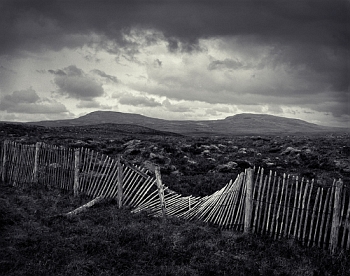 Joakim Eskildesn via Heading East
______________________________________
To Roosevelt
Rubén Darío
Nicaraguan poet
January 18, 1867 - February 6, 1916
translated by Lysander Kemp...
You think that life is a fire,
that progress is an irruption,
that the future is wherever
your bullet strikes.
No.
The United States is grand and powerful.
Whenever it trembles, a profound shudder
runs down the enormous backbone of the Andes.
If it shouts, the sound is like the roar of a lion.
And Hugo said to Grant: "The stars are yours."
(The dawning sun of the Argentine barely shines;
the star of Chile is rising..) A wealthy country,
joining the cult of Mammon to the cult of Hercules;
while Liberty, lighting the path
to easy conquest, raises her torch in New York. ... (more)
Poems By Ruben Dario
translated by Lysander Kemp
______________________________________
Winter is good - his Hoar Delights
Italic flavor yield
To Intellects inebriate
With Summer, or the World -
Generic as a Quarry
And hearty - as a Rose -
Invited with Asperity
But welcome when he goes
- Emily Dickinson
______________________________________
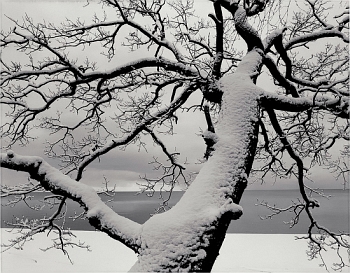 Joakim Eskildesn
______________________________________
Orientation Weekend
August Kleinzahler
paris review
At the Hotel Oblivion, Airport Drive
Mezzanine, Conference Center B
PowerPoint presentation no. 1
Career Enhancement Strategy
Mary-Ray’s pink ice service trembles
In the aftershock of some astral seizure
So remote and faint
Only the weevil’s foreleg dares say
Yes, yes, yes, it’s true
Next up
Team Building Exercises
Woof, woof
... (more)
via the page
 Listening to a murder mystery
Esther Bubley
1943 ______________________________________
As I started to write The Book of Questions, I got the impression that the culture I had relied on so far was violently cracking up. At any rate, I felt that it was no longer able to channel the anxieties I was harbouring. I no longer belonged - and foresaw that I would have to ground my writing in this not-belonging. Ragged phrases, shards of dialogues slowly surfaced - but as if from an anterior memory. Without knowing it, I was listening to a book rejecting all books and which I obviously did not master. I was interrogating this book even as I was writing it, expecting that it would create itself through the interrogation itself. But was it one book or were there innumerable books inside the book, from which its form, its ruptures, come? In a way I had to track the book beyond its ruptures, to where it has no longer any belonging or place or resemblance, where therefore it escapes all categories and traditions.From the Book to the Book: An Edmond Jabes Reader
Rosmarie Waldrop (Translator)
courtesy of Spurious
______________________________________
"roaming in a body bag of Cartesian illusions"
from
my software mission
Maged Zaher
jacket ...
the phonemes we used to leave voice
messages showed up first in childhood
before we burned our limited body language
in a copy of the apocalypse
(the pure version that follows each death)
all the symptoms of mysticism
were lost under the city’s delightful rain
& in the terrific tragedy of realizing (or not)
that the love that looms like l=o=v=e
looms only in my software mission
and the cute emergencies
of a stranger extrapolating
his jealousy of the natives
and prompting himself to save his secular freedom
with vodka martinis
tormented with his elaborate blog
the space creatures orbit
his busted metaphysical quest:
taking de Sade for a lunatic saint
& Zizek for an animation character
rationally placed in a Japanese movie.
in the right frame of mind
i would be falling on your little feet
but my worst fear is heaven:
its laminated layers
and the isolation of the dreams the lead to it
looking from these irregular windows lead to my voyeurism
yet, i saved the dress code for the future engineers
who paid for hope in cash (and sometimes in songs)
but would it help if they revoked your driving privilege?
it’s still a long shot to find love
while playing a secondary role in the script ... (more)
Four Poems Maged Zaher Exquisite Corpse
______________________________________
 Laura (Riding) Jackson
16 January 1901 - 2 September 1991 1 2 3
Riding's reason
An introduction to Laura (Riding) Jackson and Schuyler Jackson, Rational Meaning: Toward a New Foundation of Words
Charles Bernstein
That He another day awoke to find himself speaking a strange language, in which everything was known and clear-as if all difficulties of the intelligence were difficulties of language alone: in this language He had but to speak to discover, as, for instance, the word for horse here not only stood for horse but also made plain the quality of horseliness, what it was.
Laura Riding, Anarchism Is Not Enough
The publication of Rational Meaning: A New Foundation for the Definition of Words brings to completion one of the most aesthetically and philosophically singular projects of twentieth-century American poetry. No North American or European poet of this century has created a body of work that reflects more deeply on the inherent conflicts between truth telling and the inevitable artifice of poetry than Laura (Riding) Jackson. This conflict ultimately led, in 1941, to Riding's renunciation of poetry; it is also the basis of this long summa contra poetica, which she wrote with her husband, Schuyler Jackson, over a forty-year period starting around 1948.... (more)
Rational Meaning: Toward a New Foundation of WordsGoogle Book
The Failure of Poetry, The Promise of Language
Laura (Riding) Jackson
John Nolan (Editor)
amazon link
______________________________________
The Long Term Fate of Our Digital Belongings [PDF]
Toward a Service Model for Personal Archives
Catherine C. Marshall et al
People are beginning to accumulate significant quantities of personal digital material, material that may be meaningful over the course of their lifetimes, and in some cases, beyond [1]. Decreasing storage costs coupled with greater sophistication in consumers’ abilities to create, record, obtain, and share new media has resulted in what we might think of as digital belongings, a mix of artifacts one has created and gathered oneself, institutional records, and published media. To a greater extent than ever before, these digital belongings form the rich backdrop of a person’s life – the photos, correspondence, financial records, video recordings, the documents they read and write, their creative work, the published work they own, and much more – that come into existence in digital form and mostly stay that way.What is the long term prognosis for this important body of
digital belongings?
via The Ten Thousand Year Blog
______________________________________
Agency, Identity and Technology [PDF]
The Concealment of the Contingent in American Culture
John Pauley
Janus Head
A culture with a procedural and instrumental outlook on reality, equipped with the capacity to create the illusion of control over the limits of the world, and with a grotesque wealth, can have very little in the way of a ground for faith. The double bind here is, of course, that this sort of culture is in great need of faith but its need cannot be fulfilled because it is this sort of culture. The instrumentalist/procedural culture cannot emerge with real truthfulness towards others because the organic conditions are missing. Control and procedure seem to eliminate contingency and contingency is the ground of spirituality. For the status quo, for the way the culture flows from day to day, being truthful to the conditions of others doesn't matter primarily. What matters is acquisition in the instrumentalist sense and this requires others and the world as instruments.(...)
The brutality of forces that have brought about this created world, which holds back the inevitability of reality only on the surface of things, are necessary elements for this created world. No illusion can be this strong and bold without such brutality.(...)
A culture, however, that has a far-reaching success, a pervasive wealth, along with a technological buffer from the harshest realities of the world is one where a most toxic mix is quite possible. The outward signs of success, taken along with (apparent) lack of misery (the buffer) make for a strong, perhaps subconscious, sense of "destiny." All those who stand opposed to such a culture must be "evil" because those within the culture must be good. Something has gone terribly wrong with the world, something is terribly out of joint in the metaphysical sense, if something calamitous happens to us. ______________________________________
 photo - mw
______________________________________
The Poet's Corner
Here where the end of bone is no end of song
And the earth is bedecked with immortality
In what was poetry
And now is pride beside
And nationality,
Here is a battle with no bravery
But if the coward's tongue has gone
Swording his own lusty lung.
Listen if there is victory
Written into a library
Waving the books in banners
Soldierly at last, for the lines
Go marching on, delivered of the soul.
And happily may they rest beyond
Suspicion now, the incomprehensibles
Traitorous in such talking
As chattered over their countries' boundaries.
The graves are gardened and the whispering
Stops at the hedges, there is singing
Of it in the ranks, there is a hush
Where the ground has limits
And the rest is loveliness.
And loveliness?
Death has an understanding of it
Loyal to many flags
And is a silent ally of any country
Beset in its mortal heart
With immortal poetry.
______________________________________
A Meter Doctor Reports From The Field
Towards a Metrical Diversity Cure (or, Why Free Verse Isn’t Free)
Annie Finch
Studio
I've come to call the condition that affects these poems "metrical incipience." This unfortunate and rarely-diagnosed affliction has been around creative writing classrooms for quite a while, and I've been noticing the symptoms for years in student poems as I make the rounds of poetry-writing classrooms as a visiting writer. (...)
the symptoms of Metrical Incipience are so sad, so debilitating. First, one or another traditional metrical pattern will erupt like some kind of stubborn rash, just at the moments when the imagery and language are gathering their most emotional momentum, and then fade back away as the poem descends back into alienation and abstraction. These local symptoms vary from poem to poem, but almost always involve a hidden metrical pattern-iambic pentameter, ballad stanza, anapests, trochees, or dactyls-that, typical of almost all poetry-writing classrooms, has not been cultivated with conscious effort towards any kind of rhythmic expression. And the general symptoms are even more painful. As the body of the poem erupts into a confusion of unacknowledged and unrealized rhythmic desires, the soul of the poem becomes tangled and distracted among the warring unconscious impulses of its body. The heart of the poem goes lonely, unable to build the home it seems to need, and the mind of the poem spins out into an isolated feeble pyrrhic victory of domination over nothing but its own physical impulses.... (more)
|










































